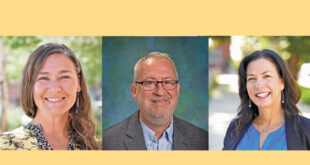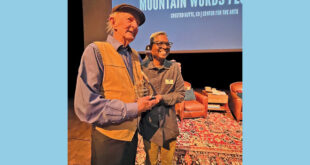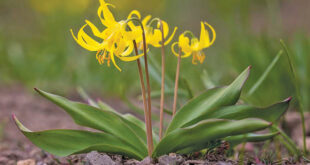by Dawne Belloise
The name Devo, unlike the 1980s band of the same moniker, is a shortened version of “development,” not de-evolution, and in fact, CB Devo, aka Crested Butte Development Team, is actually evolving kids into excellent cyclists, responsible trail guardians, teammates, and community members through its programs.
As with many great concepts, CB Devo came to fruition around a campfire when Amy Nolan and her hubby, Mike, were discussing what a wonderful thing it would be to bring the biking program they had just witnessed in Durango to Crested Butte.
“My husband and I have three kids, ages seven, nine and 11,” says Amy, “and when we saw the programming that Durango offered, while we were over at the 12 Hours of Mesa race in 2014, it was pretty powerful seeing the energy behind the team there. So many young riders, middle school age kids with great attitudes, and really good trail etiquette.”
Amy and Mike concluded that a program like that could use cycling to focus on making better people, better community members, and better friends, not just better bikers, and they could do it in a non-competitive program.
The CB Devo mission is: “The Crested Butte Development Team is a 501(c)(3) non-profit organization that was created to give the youth of our community a fun and safe outlet to explore the amazing mountains of the Gunnison valley by mountain bike. Our main focus is to create lasting memories and provide each rider with not only superior bike handling skills but life skills that they can carry into their adulthood. We hope to instill a respect for the trails, our community, and fellow teammates.”
The primary goals of Devo are threefold, with the first being fun, with safety equally important, as are learning skills. Amy, executive director of Devo, feels the foundational theory works well and the program itself has been extremely successful in not only developing champions but more important, developing lifelong cyclists. “If you do those first two things, you’re keeping it fun and keeping it safe, then the kids will develop the skills that they need when they’re ready. Once that happens in a very supportive environment, where the kids encourage each other rather than compete against each other, then there’s this endless possibility for success in your biking, as a rider, and as a person in the community,” Amy explains of the life skills the program incorporates.
Kids start with CB Devo as young as seven and can continue through 18 years of age. The seven-year-olds are Mini Devos, followed in age by the eight- to ten-year-old Devos, and middle-schoolers between 11 and 13, with the eldest group being the High School Devos, ages 14 to 18.
“We have a ton of kids returning to Devo every year, which is why we now have the high school program,” Amy says. “The kids who were in our program for the last two seasons are now choosing to continue. Two years ago, the team had only 11 kids and now we have 29 kids.”
It’s a nine-week, true curriculum program structured for local kids, that instills confidence and fitness. Amy notes, “You don’t go out and ride Doctor Park or 401 before the riders have the skills and confidence to do so safely. We spend a lot of time in the parking lot working on good body position drills and technique because that’s a safe environment. In the nine weeks, we spend the first four weeks building good fitness and developing tech skills so that later in the season we can safely bring kids to trails all over the valley. We’re confident that before we take kids to these trails they have the ability to do so.”
Nolan has heard countless stories of kids who have an undesirable experience because they’ve gotten in over their heads, or are put into a situation that is above their ability, “And they crash, have a horrible experience and then they’re scared and they don’t want to get on their bike again. We have some of those in our class. We have several kids that we’ve really had to work hard with to get through that fear to enable them to have fun again on their bike.”
A couple of years ago, there was only one girl on the team, and she had to be recruited. This season there are eight girls on the team. Nolan cites one of the reasons it is significant to have a girl on the team. “For teams to score, to get a team score, you have to have at least one girl on your team, so two years ago, if we weren’t able to get that one girl on our team then we wouldn’t have been able to get a team score.
The regular Devo program we offer is non-competitive,” Amy says, although they do encourage team members to attend races and challenge themselves in whatever discipline they choose, whether it’s cross country, enduro, or downhill. “But the high school team is different because the body that governs that racing is called the Colorado High School Cycling League and it’s a scoring-based format—but what makes it different is that everybody’s performance and scores count, everybody rides and everybody contributes to the team’s success.
CB Devo also touts a junior mentor and junior coach program. Amy explains, “Jason Lakey, who helped us start CB Devo in 2014, had a group of boys who he had been riding with for a couple of years, before Devo was founded, primarily fifth and sixth graders. As they grew up, Jason wanted to find a way to keep them involved with the program and that’s where the junior mentor program came from. Basically, it was a way for these older kids to be good role models for the younger riders, and at the same time, have a volunteer program for the youth non-profit, to give back to the community by being involved with the program and leading by example with the younger kids.”
This year is the first they’ll offer junior coaching positions. “The idea behind this is to emphasize life skills for high school juniors and seniors who have volunteered as junior mentors for two seasons. The life skills that we’re trying to reinforce for this group of juniors and seniors is communication, accountability, and ultimately being responsible for yourself and your actions,” Amy says.
She feels that in our culture, it’s easier to send a text message rather than meet face to face, “and the expectation is that these young adults will learn how to communicate with others in a conscientious and courteous way,” and yes, Amy says, the parents love this. “This year we have nine junior mentors, who are freshmen and sophomores, and nine junior coaches who are juniors and seniors. We provide these leaders with safety and skills training so that they can ultimately be prepared to help our head coaches in any number of situations. It all goes back to being more than just a bike program, the kids we’re seeing now in our younger groups will go through this program and become the future junior mentors and coaches who will give back to not only the program but our community.”
With CB Devo, it’s all about the kids and for the kids. Amy says, “The community’s support for this program has been really through the roof and that’s not just regarding financial contributions and donations but also access. The Crested Butte Land Trust generously grants us access to use their Lower Loop and Lupine trail systems and the U.S. Forest Service recently approved our application for a ten-year priority permit, which allows our program to ride on any U.S. Forest Service trails in the Gunnison Valley. That’s huge, and it was a really, really big hurdle. We do really emphasize trail stewardship in our program by providing opportunities to be involved in local trail workdays. As an example, this is our third season bringing and organizing kids to join CB Land Trust and Crested Butte Mountain Bike Association [CBMBA] for National Trails Day. It’s an opportunity to come together to work on local existing trails or build new trails through volunteers.”
In June, CB Devo organized a significant number of families of their program to join up for the trail workday that saw much-needed work done on the Lupine and Gunsight Connector trails. “It was a collaborative effort between the land trust, CBMBA and the new Crested Butte Conservation Corps.”
CB Devo is coordinating with Mountain Manners, who will be meeting with each of the kids’ groups for two sessions each during the first three weeks of programming to reinforce trail etiquette and how to be a polite and respectful trail user. Gillian Rossi, the Mountain Manners program coordinator, developed the curriculum specifically designed for the Devo program.
Also, as part of Crested Butte Bike Week, CB Devo is presenting the Junior Crested Butte Bike Week. “Last year was the first and it’s basically all about having fun events for kids all weekend, any kids, anyone who’s in town with kids. We use this as the main fundraising event for our program. We’ve got a fun slow race – the last one to the finish line wins but the trick is, you can’t put your feet down. There’s a movie night where we show bike films at the Majestic Theatre. We also have pizza and ice cream party, generously donated by the Brick Oven Pizza and Third Bowl Ice Cream. We offer skills clinics, group rides and the Junior Wildflower Classic race on Sunday, June 25. There’s something for everyone, we’ve got it all for this event. We’ve already had many registrants from all over for Junior Bike Week,” Amy says, and adds, “The CB Development Team is more than just taking kids out on the trails. There’s so much more in the bigger picture, it’s so much more than just being on your bike.”
For more information, visit crestedbuttedevo.com.
 The Crested Butte News Serving the Gunnison Valley since 1999
The Crested Butte News Serving the Gunnison Valley since 1999




